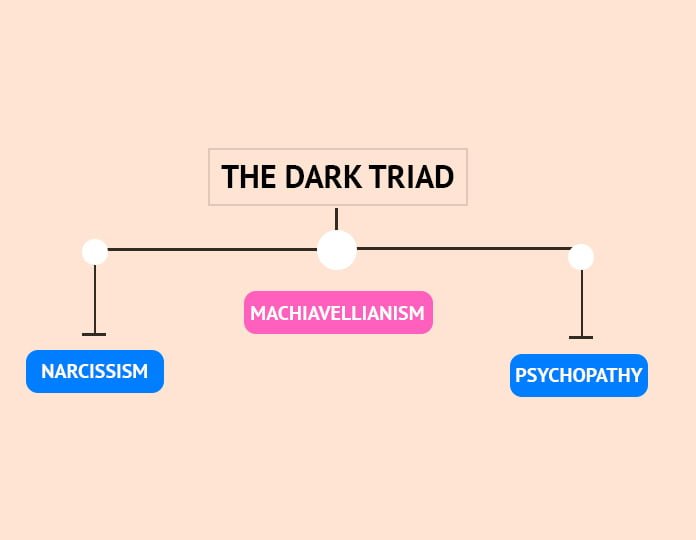The Dirty Dozen- Understanding the Dark Triad Personalities
Do you sometimes question the behaviour of some people as to how and why they are the way they are? Well, today I want to speak about the ‘Dark triad’ theory first developed by Delroy L. Paulhus and Kevin M. Williams in 2002. To explain the dark triad theory simply, I want to give this very famous example. “A narcissist, a psychopath and a Machiavellian walk into a bar. The bartender asks about the darkest personality out of all three? The Narcissist says ‘me’, the Psychopath says, ‘I don’t care and the Machiavellian says ‘it’s whoever I want it to be’.”
Although the dark triad theory is still in the form of a bud waiting to bloom. It has gained a lot of attention in the past two decades. It is widely studied by Organisational, Clinical and Forensic psychologists to understand managerial leaders, convicts as well as problem-makers in society. I was intrigued by Jordan Peterson’s interview on ‘the dark triad and lulz culture’ which tickled my fancy to dive into this dark side of human personalities.
Dark Triad
Let’s understand what exactly the dark triad consists of. The dark triad consists of three types of personalities. One of which is Narcissism, which is a personality disorder according to the ICD and DSM. It characterised by delusions of grandiosity, a sense of entitlement, lack of empathy, dominance and superiority. Narcissism can be measured by the Narcissistic Personality Inventory. The next personality type is Psychopathy which is characterised by high levels of impulsivity and thrill-seeking or mental thrills and low levels of empathy. They are cold towards other people. Psychopathy is defined as the most ‘malevolent’ of the Dark Triad.
The most famous scale used in measuring psychopathy is the self-report psychopathy scale. It is defined as the “gold standard” to quantify forensic psychopathy. The third type of personality is Machiavellianism defined as being cynical, unprincipled and use of manipulation as a tool for self-benefits and success. Mach IV is widely used to measure Machiavellianism.
The dark triad initially consisted of three types of personalities; however, Sadism has been recently added to it. Sadism is defined as taking a positive delight in causing pain to others. You may have heard of the ‘lulz culture’ online which is a culture of sadistic, machiavellian, narcissistic. Psychopaths that consists of a wide range of online phenomena ranging from childish pranks to anonymous, shadowy messages and ideologies. Some of the pranks pulled by the lulz are seriously dangerous to the other person yet the lulz have a good laugh about it. Universal ways to quantify the dark triad personalities have been developed such as the Dirty Dozen which is a 12-item scale (Jonson & Webster, 2010).

Personality and Dark Triad
Narcissism and Psychopathy are clinical personality disorders according to the DSM and ICD. However, Machiavellianism has been originated from the philosophy and tactics of Nicole Machiavelli, an Italian diplomat who believed that “acquiring a state and maintaining it requires evil means”. Hence, Machiavellianism is part of the subclinical population that cannot be diagnosed by standard psychological assessments similar to the Big Five personality theory given by Costa & McCrae.
Although it may seem like the ones that belong to the dark triad personality spectrum are those who are behind bars or on the run from the authorities, it is not true. Dark Triad personalities can be seen in politicians, workplaces, as well as businessmen who are part of our society and thriving. Narcissists use a sugar-coated method of manipulation by charming their way up to the top. Psychopaths are more dominant and use fear, while Machs can change their shape like water by shifting between both those methods.
Those who score high on these three personality traits are prone to commit crimes and create a crisis in society, family and organisations. According to research, men tend to score higher than women on all three traits. Cultural constructs of masculinity and femininity, more specifically negative sexist stereotypes could be a cause for dark triad traits in men. It can also be associated with forms of prejudice like racism. According to one study, narcissists and psychopaths are typically antisocial, whereas Machiavellians are prejudiced against ethnically marginalised groups. Another study discovered a link between dark triad traits and social dominance outlook or an acceptance of social hierarchies.
There are of course genetic correlations but environmental factors are more prominent in raising dark triad personality children. A psychopath father may pose as a role model for his child, a man may teach his child all his tricks and a narcissist may bring up a child who is also obsessed with perfectionism. We live a slow life where we get an education, get married, have children and spend time bringing them up but when the desire to speed things up takes over and one wants to achieve most in a short span of time then they may take the easy way out by flowing into the dark side of personality. That is why they do well in competitive environments like business, organisations, and politics.
These personality types have a lot of side effects to be how they are. Because their mind is programmed to be impulsive, aggressive and selfish, they are prone to substance abuse, feel excluded, suffer from depression as well as end up in jail. The smart way would be to of course protect ourselves from these unpredictable minds. We have to understand that they are how they are due to certain genetic conditions and unfavourable environments that moulded them to become this way. They probably did not receive any kind of help when these traits initially started to show and eventually took over them. We all have certain dark traits within us but growth lies in recognising and developing coping strategies to deal with them.













Leave feedback about this